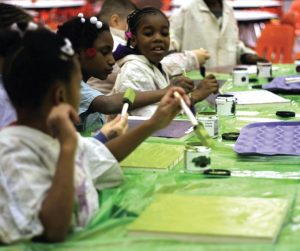601 Tully: Center for Engaged Art and Research, the Central New York Community Foundation, and the Seymour Dual Language Academy will host the Nature Matching System mural unveiling and curriculum presentation on Thursday, March 20, from 2:30-3:30 p.m. The event will be held at the Seymour Dual Language Academy at 108 Shonnard Street in Syracuse.
 The Nature Matching System is a color chart developed by artist Tattfoo Tan used to remind us to consume our recommended daily dose of fruits and vegetables. Tan’s Nature Matching System is accessible through various media, including murals, placemats, screensavers and now as an elementary school curriculum.
The Nature Matching System is a color chart developed by artist Tattfoo Tan used to remind us to consume our recommended daily dose of fruits and vegetables. Tan’s Nature Matching System is accessible through various media, including murals, placemats, screensavers and now as an elementary school curriculum.
Artist and Syracuse University Associate Professor Marion Wilson, a class of Syracuse University students and Tan created the art and nutrition curriculum of four lesson plans introducing the Nature Matching System. This curriculum was piloted on Syracuse’s Westside with the entire third grade at Seymour. The culmination of the project is a student-created mural that will be on permanent display in the Seymour cafeteria, reminiscent of the Nature Matching System.
“It was fun working with Syracuse University students because we got to learn about different vegetables and what the different colored foods do to make our bodies healthy. We made smoothies and tasted fruits I haven’t tasted before,” says Jada James, a third-grade student at Seymour. “Doing this is going to help me eat better and think better.”
“The partnership with Syracuse University in the Nature Matching System project has left quite the impression with our students and school community,” says Geovanti Steward, the principal of Seymour. “It was a great example of engaging students in concepts that span not only several disciplines, but everyday healthy living habits. I believe that is what developing the whole child is all about.”
The piloted curriculum at Seymour was in partnership with 601 Tully: Center for Engaged Art and Research and Nojaims Bros. Supermarket, and funded by a grant from the CNY Community Foundation. The intent is that, with four outlined lesson plans, the curriculum can be re-introduced particularly at schools located in urban food deserts.
As many as 43 percent of residents rely on food stamps, and obesity and malnutrition reach their height at both the local and national levels. The Nature Matching System curriculum aims to link consumers with producers and suppliers so that they can make healthy and affordable choices about the food they eat. The Nature Matching System informs youth of the holistic value of food and the intrinsic connections between their environment and their health.
